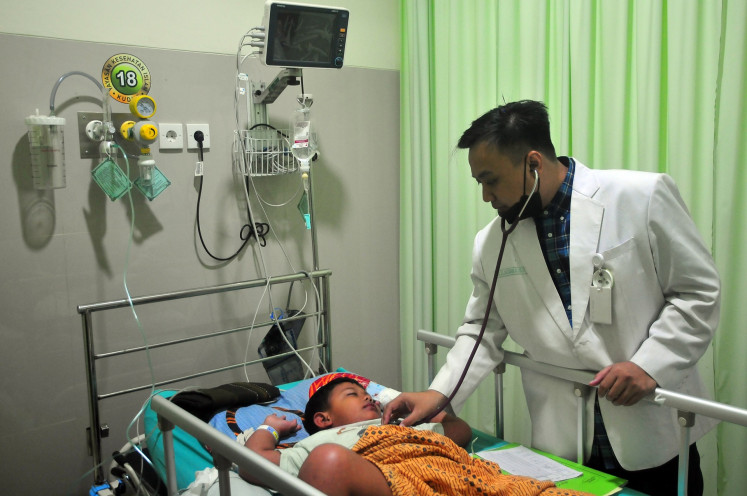Popular Reads
Top Results
Can't find what you're looking for?
View all search resultsPopular Reads
Top Results
Can't find what you're looking for?
View all search resultsIt’s time to prepare our digital healthcare system
With a fast growing online population, Indonesia actually has a huge opportunity to build a sufficient digital health ecosystem.
Change text size
Gift Premium Articles
to Anyone
H
ealth Minister Budi Gunadi Sadikin’s recent call for immediate digital transformation in health care only reminds us that we have yet to tap the full potential of digital technology. In fact, the use of digital technologies can improve patients’ access to quality care and save costs.
Speaking in a webinar on April 21, Budi said he had been mandated by President Joko “Jokowi” Widodo to fulfill three critical tasks in the health sector: First, to ensure the successful delivery of important and urgent vaccinations; second, to tackle the COVID-19 pandemic; and third, to transform health service delivery.
Budi said the health sector needed reform so that the nation could achieve its dream of promoting healthy lives and the well-being of its people at all ages. The minister was convinced that with the limited number of doctors and geographical challenges across the country, digital technologies would be very helpful in the delivery of care.
To support the development of a digital health ecosystem, the Health Ministry says it has composed some regulations related to the implementation of information and communications technology (ICT) in the health sector. The regulations include Health Ministerial Regulation No. 20/2019 on the implementation of telemedicine in healthcare facilities and several other regulations being formulated, including a draft regulation on electronic medical records (IMR).
Digital technology plays a vital role in the effective and efficient use of health resources, especially in dealing with the COVID-19 pandemic. Budi says it is now on top of the government’s agenda to optimize the use of health technology to ensure that once the pandemic is over, it can continue to deliver health services, in which patient safety is still the ultimate priority.
With a fast growing online population, Indonesia actually has a huge opportunity to build a sufficient digital health ecosystem. The internet penetration rate in Indonesia stood at 73.7 percent in 2019, up from 64.8 percent in 2018, the Indonesian Internet Providers Association (APJII) revealed in its 2020 survey. More than 95 percent of Indonesian people access the internet through smartphones with mobile data, the survey further says.
The fast growth of Indonesia’s online population clearly lays a solid foundation for the country to accelerate digital health. While digital health technology has made a big move forward during the COVID-19 pandemic, health policies in many countries in the Asia-Pacific region, including Indonesia, in fact could not keep pace with the rise of health technology innovation. In many countries, digital solutions have not been fully integrated into healthcare systems.

















